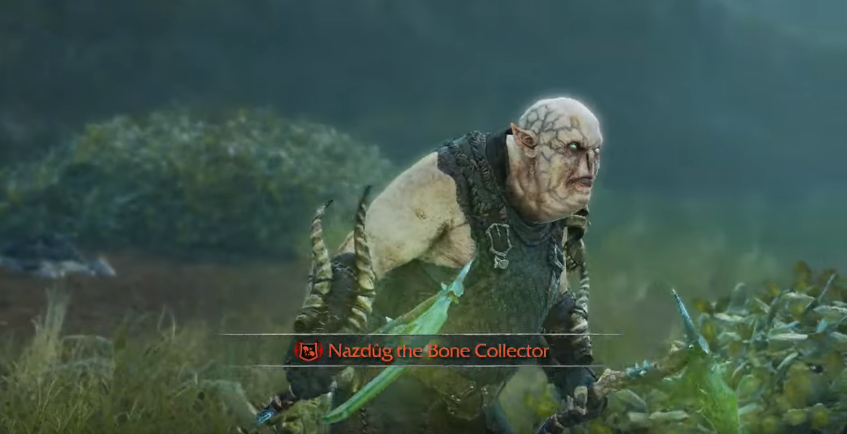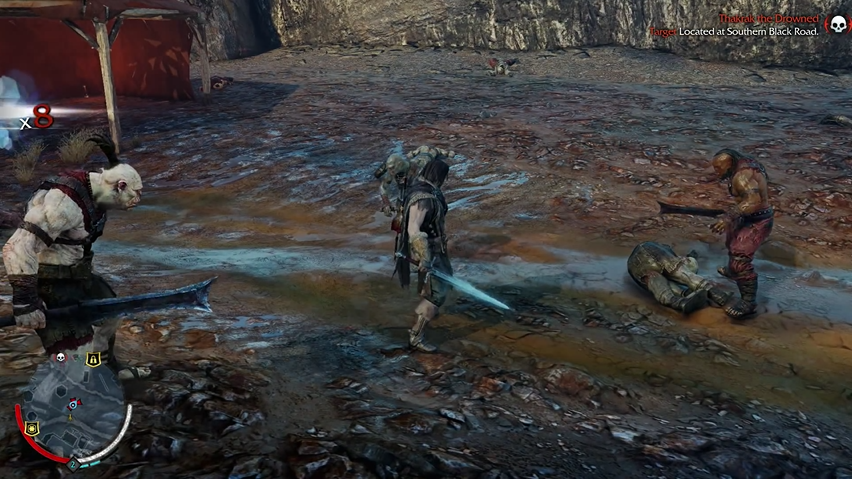Middle-Earth: Shadow of Mordor Review Overview
Strengths
+ A perfected and more varied version of the Batman Arkham series' fighting system
+ The Nemesis System
Weaknesses
- Story doesn't expand on or take advantage of the Lord of the Rings universe
- Forgettable music
MIDDLE-EARTH: SHADOW OF MORDOR INFORMATION
Release Date: September 30th, 2014 Developer/Publisher: Monolith Productions/Warner Bros. Interactive
I love The Lord of the Rings, and I enjoyed the Batman Arkham series, and Middle-Earth: Shadow of Mordor almost perfectly combines the two in a game which really exceeded expectations. There really were no expectations for Shadows of Modor. There was no direct connection with the books or recent films, it was assumed to be an action game in the vein of Batman: Arkham City with a similar world, but what came were added RPG elements that truly changed the fighting mechanics and a world that capitalized on the military hierarchy of the Orks and Uruk Hai.
Story - Middle-Earth: Shadow of Mordor Review
Shadow of Mordor tells the story of a Ranger, Talion and an Elf, Celbrimdor, shortly before The Fellowship was born. They are connected through generations and a common enemy, but the story isn't what motivates the player to keep going. The story isn't bad, but it's not memorable, especially compared to any of the four novels its world is based in. The source material is both a hindrance, because the game's story cannot compete comparatively, and a positive, because the story is part of a bigger world, an absolutely fantastic creation that has essentially influenced every fantasy game ever made. It is really The Lord of the Rings universe and the characters sprung from that universe that give the game its narrative legs. To be fair, to have a story that attempts to match the epic nature of the books is a dangerous gamble and the simpler, more isolated story of Tailon, the playable ranger and his Elf companion, Celebrimbor, is a much safer, albeit less daring play.
At it's core, Shadow of Mordor's story is a simple revenge tale. There is a slight mystery of who should be sought after, and of course as that's unraveled there is a larger, more sinister figure behind it. Again, this gives the overall plot it's legs but it is the numerous ancillary antagonists that give it its weight and a few allies, some from the trilogy, and some not that build out the story and make the entire world feel alive.
While your essentially playing as the ranger Talion, Celbrimdor's influence on the story is really the driving force. Talion's mission would simply be vengeance on the Black Hand, the primary conspirator during the prologue. Celbrimdor, however ties the revenge tale into the most familiar aspects of the world, one in particular that will unfold as you progress. Both have similar paths, but have to use each other to arrive there, in short, they'd be lost without each other. This dynamic, and what it is the learn of each other are essentially the story. It's the character development and their connection the binds the universe with the world of Middle-Earth's preexisting problem, that of Mordor and the evil of Sauron.
Shadow of Mordor introduces a new gameplay mechanic called the Nemesis System. This adds such a terrific layer of context to each enemy you engage with. These are not bosses mind you, this is every single Ork, Uruk-Hai or otherwise that you come across, and depending on the outcome of each fight it affects that enemy's standing within their army. If you are defeated that enemy can increase his rank, and if killed by you they'll possibly lose rank. This creates a personality for each one of these enemies, and when met again in combat they'll want revenge or trash-talk that they have previously defeated you. It doesn't necessarily affect the plot but it plays a huge role in motivation, making combat tremendously fun in how it ties into the world.
Technical - Middle-Earth: Shadow of Mordor Review
Outside of the graphics there aren't really any other technical aspects to note. The physics are solid, loading times are relatively quick for an open world game and the frame rate is steady.
Because Shadow of Mordor was designed for last generation consoles in addition to the latest, the graphics aren't awe-inspiring as the textures are flat. They do however, do nothing to detract from the experience. In fact, they are still beautiful at times, especially later in the game where lush, green grass replaces the scorched earth of most of the game. Shadow of Mordor is also absolutely stunning for the PlayStation 3, and the PlayStation 4 version of the game is definitely more than a "remastered" version of the previous generation. The real standout are the character models, particularly the enemies. Because of the nemesis system, each character (for the most part) are original designs. And while at first glance, especially in the heat of battle, they appear to be the same character models, they are only similar in class. There are certain details that help differentiate them, and these will be seen within specific interactions of these characters or on the "nemesis board." This is another nice touch that lends to the personal stake in each battle.
The sound effects mirror the film's nicely, making recognizable clangs, arrow releases and horns and vocals of impending orcs and Uruks. In the instances in which special attacks are used, the sound effect is almost as pleasing as the display, it can be cathartic to phase in and out using Celembridor's wraith powers or the the swift slice of the neck severing the head from body.
Music - Middle-Earth: Shadow of Mordor Review
Influenced heavily but hardly equal to the source material, the music is mostly forgettable. It's not bad, but it would not be recognizable out of context and only serves as a backdrop in game. It would've been nice to have shared some of the same musical themes from the movies that the game takes practically every cue from. Overall, it's all fairly generic. This is weak point for the game (in a game with numerous strengths), despite, on it's own merits, the music is OK. Because of the inevitable comparison to the films and even the other features of the game, it stands out for the wrong reasons.
Unfortunately, it sounds like the creation process of the music was quite original, with the music and sounds specifically design to react to the combat. This was intended to add a rhythmic punch to the already free-flowing combat, but it's hardly noticeable.
Gameplay - Middle-Earth: Shadow of Mordor Review
I've explained the Nemesis System and it's affect on the story, but without tight combat the motivation it provides would be moot. The combat that felt so new and free-flowing in the Batman: Arkham Asylum and the games in that series that followed is mirrored here, but there is much more variety and somehow it feels even smoother. Middle-Earth: Shadow or Mordor is the perfected edition of the Arkham fighting style as the sincerest form of flattery to the series it owes so much to. Traversal in the game is mostly done on foot, which at first sounds like a lot of time spent going from place to place, but so many times you encounter an enemy brigade and clash swords, and never is it an annoyance. In fact, if all the game was spent fighting, with no plot points intertwined, this game would still be tremendous fun. There are certain challenges within the game that bring on hordes upon hordes of enemies. It can be difficult, and it may take several attempts, but each time you improve, your grasp on the combat becomes better, and never does it become frustrating as your only defeated because of your own mistakes.
““Each time Talion is slain, the enemy that defeated him grows in power and moves up the ranks, so the next time you come face to face with them, it will be a more difficult fight...””
Unlike the Arkham series, the weapon and move upgrades make fighting enemies progressively more interesting. Instant decapitations after reaching a designated amount of hit combinations is so satisfying that prolonging fights just to use it multiple times, instead of whittling away at their health, is much preferred. It is hard to ever imagine never having this ability. After a certain amount of combinations are pulled off, your sword glows, indicating that a decapitation and instant death is ready to befall your enemy. This, along with several other abilities are so useful in fact, that it's hard to imagine every playing without them. This is a sign of how good the combat is and evolves as the game pushes on. These skills are absolutely necessary as the more difficult enemy types can't simply be hack-and-slashed. These are all acquired after earning experience points and applying them to an experience tree. This is no different than any other games in the genre, but it doesn't have to be. Unlike many other games that feature similar skill paths, there are no throwaway skills just to reach the next level. These are all useful, and even the essential skills, such as the decapitation, while seemingly making the game easier, is ultimately balanced out by the foe difficulty. This is where the Nemesis system really influences the gameplay. Each time Talion is slain, the enemy that defeated him grows in power and moves up the ranks, so the next time you come face to face with them, it will be a more difficult fight...sometimes. Many times, when fighting a large group of enemies, even the weakest of them can land that critical blow, and a promotion does little to make them stronger in a head to head fight. It's such a novel system that revenge can be exacted with ease, especially after the pre-fight banter amp you up.
Artificial intelligence can make or break a game, especially when it comes to the enemies. Because of Shadow of Mordor's Nemesis System, the AI has never been higher. Enemies literally learn tendencies and whether they fall in battle or defeat you, these learnings will be used upon your next encounter.
While a vast majority of gameplay is spent in combat basically any controllable action is done well. The free-running makes climbing walls and structures pleasant as opposed to frustrating, quick-time-events feel natural and aiming or targeting is utilized organically. There are several instances where the opportunity to ride a beast come up, sometimes useful, it seems more of a throwaway. It's only required for a mission or two after that but these beasts become useful in other ways, such as pitting them against enemies and as a distraction. It's definitely not a weak point, rather a ode to how good the rest of the gameplay mechanics are.
Middle-Earth: Shadow of Mordor Review Roundup
This game was announced with little fanfare. The Lord of the Rings trilogy had come and gone ten years previously, as had most of the related media that capitalized on it. As great of a license as The Lord of the Rings is, videogames designed with that license have never been more than solid. Shadow of Mordor is beyond solid, it was a surprisingly fantastic experience. It's mechanics may be unoriginal, essentially using the same combat system as the Batman Arkham series, but Shadow of Mordor does it better, which is high praise.
The nemesis system however is highly original and makes simple enemy encounters tense-filled when they have ne business being so. It's a rpg system for the enemy, a highly intuitive feature that truly makes this game a stand out.
The things in which Shadow of Mordor doesn't exceed at does little to sour the experience, and with a better plot, better music utilization and fully developed for the latest generation of consoles, Shadow of Mordor could have been a close to flawless experience.







